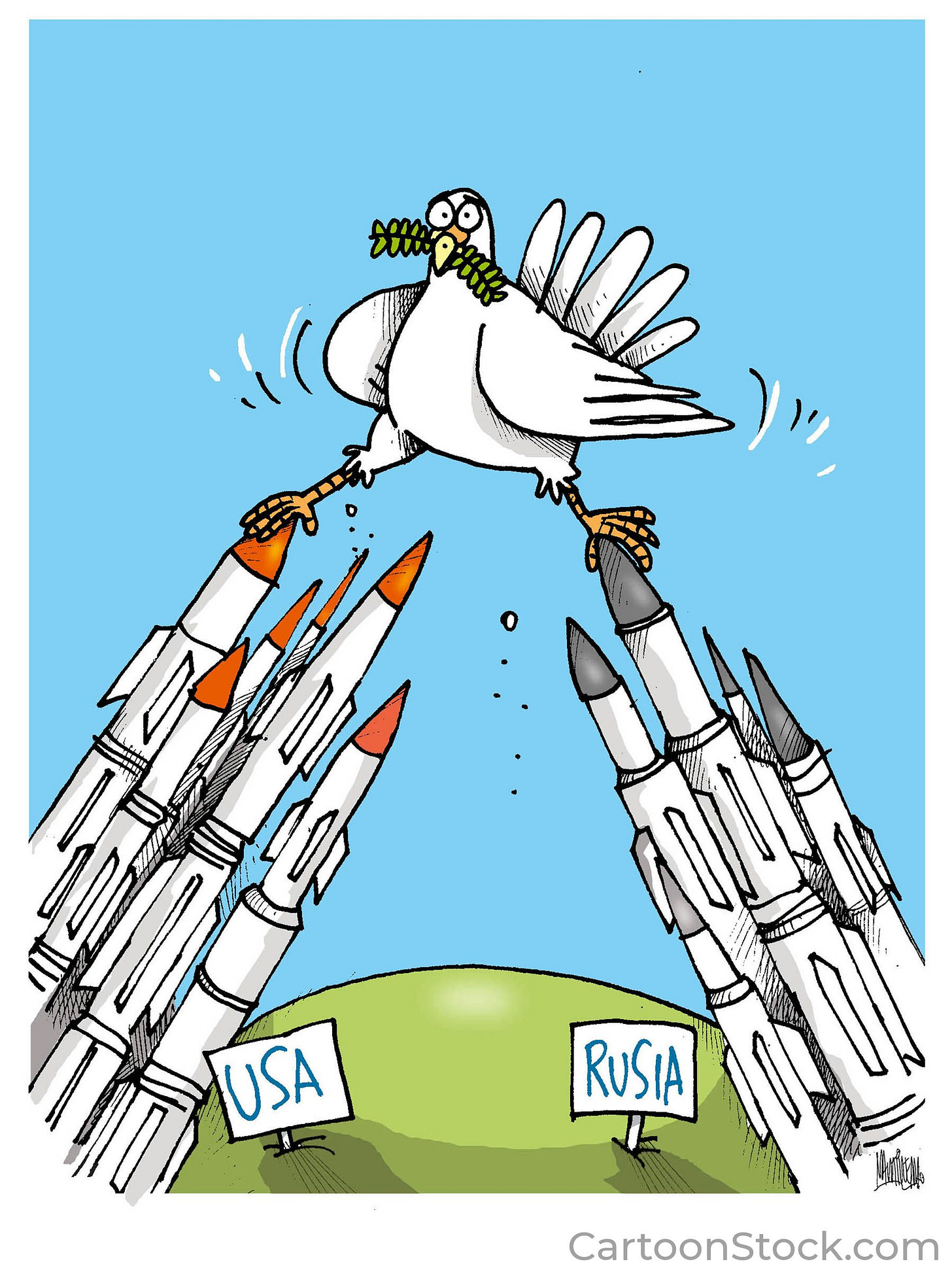Operation Obstinate Loon
NATO and Russia each choose this fraught moment to hold mock nuclear war games
Dear readers: A version of this article is published at The Nation, America’s most venerable politically liberal magazine. So it can be read either here or there. (I generally resort to a paywall at Substack only when another publication also has rights.)
Day after day, the Russian president talks of using nuclear weapons. The American president says it’s been awhile since we “faced the prospect of Armageddon” like this. The UN Secretary General says we’re all “just one misunderstanding, one miscalculation away from nuclear annihilation.” A former Chairman of the Joint Chiefs of Staff — the highest ranking U.S. military officer — says Vladimir Putin is like “a cornered animal” and therefore “we need to back off that [Armageddon talk]” and urgently engage in real diplomacy before it all goes horribly sideways.
And as the rhetoric soars, so does the violence: Massive pipelines explode, the bridge to Crimea is aflame, and Russia and Ukraine pound each other with ever-heavier explosives.
Enter NATO — which chooses this perilous moment for mock nuclear war games.
What. Too soon?
On Monday, the U.S.-dominated military alliance kicked off two weeks of what we’re apparently calling “Steadfast Noon.” Fighter jets, nuclear-capable long-range bombers, refueling tankers — about 60 aircraft in all, from 14 nations — will zip back and forth across Europe, rehearsing for Armageddon Day. NATO in a press release says not to worry because no live nuclear weapons will be used. (That said, Belgium is both the official host for Steadfast Noon, and also one of the few European nations where U.S. nuclear weapons are stationed.)
Six months ago, the Pentagon cancelled plans to test-launch some of its intercontinental ballistic missiles. Even then, with Russia’s invasion of Ukraine still young, the risk of a nuclear “miscalculation” was felt too high to proceed.
Today, the violence, rhetoric and emotion — and the risks of miscalculation — are all incalculably greater. But NATO Secretary-General Jens Stoltenberg doesn’t see what the big deal is.
“It would send a very wrong signal if we suddenly now cancelled a routine, long-time planned exercise because of the war in Ukraine. That would be absolutely the wrong signal to send,” Stoltenberg told reporters last week.
As forehead-smackingly dim-witted as this sounds, NATO is not the only idiot in our global village. Russia, too, plans to hold mock nuclear war games — at the same time as NATO’s.
The Russian version of Steadfast Noon is called “Grom”, or “Thunder”, and according to the White House will involve large-scale maneuvers of nuclear forces and live missile launches. It is expected to start within days.
It turns out Steadfast Noon and Grom are reoccurring exercises, and officially the U.S. government emphasizes the routine nature of it all. Everyone’s just limbering up the nuclear war machine at the height of an international crisis — when Putin’s “a cornered animal” and we’re oddly close “to Armageddon,” a mere miscalculation from “annihilation” — but it’s all routine, nothing to see here.
Of course, even “routine” can go horribly wrong. Earlier this year, a “technical malfunction … during routine maintenance” caused India to accidentally launch a nuclear-capable supersonic missile right into Pakistan. To this day Pakistan is not amused — but we should all be grateful Islamabad showed restraint back in March and did not assume it was under nuclear sneak attack.
Would Moscow or Washington keep it’s cool if a similar “technical malfunction” occurred during Grom or Steadfast Noon?
Thoughts like these have occurred to U.S. war planners. A “senior U.S. defense official” has been quoted from CNN to Reuters complaining that “[Russia’s] decision to proceed with this exercise while at war with Ukraine is irresponsible.” Other unnamed U.S. officials note it can be hard to tell the difference between an exercise and the opening moves of a nuclear attack. “This is why you don't want to have extraordinarily overheated rhetoric at the same time you're going to do a nuclear exercise,” observed one official to Reuters.
All of these nuclear war exercises, NATO’s and Russia’s, should clearly be called off in the name of basic common sense. Instead of pantomiming the destruction of each other — always remember, nuclear war would involve the mass murder of not just civilians, but of children — we need Washington and Moscow to sit down and talk. We need that to broker peace in Ukraine, but also to rededicate to our mutual treaty obligation to seek a draw-down of all nuclear weapons everywhere — as the majority of the world’s nations have demanded. Sound Pollyannish? Disarmament day may be closer than you think. Even the terse NATO press release announcing Steadfast Noon closes with the assertion that NATO itself is preparing for “a world without nuclear weapons.”
For now, though, the U.S. party line is that Russia’s exercises are reckless and should be called off, while NATO’s are excellent and should march onward. It would be hilarious if it wasn’t so hair-raising. If the Cuban Missile Crisis 60 years ago was headed off thanks to “strategic empathy,” as Nation editor Katrina vanden Heuvel has written, today we’re apparently counting on “careless sociopathy” to see us through.
Steadfast Noon calls to mind another now-legendary NATO nuclear war exercise from the 1980s: Able Archer. Then as now, U.S.-Russia relations were grim.
Keep reading with a 7-day free trial
Subscribe to The 100 Days to keep reading this post and get 7 days of free access to the full post archives.



